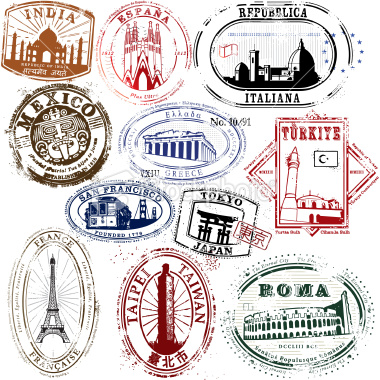 |
 |
- Keep your money on
your person during transit, and in a hotel safe (except for what you
need) while at your location. Use inside pockets or a money belt, or
divide the money up amongst several pockets, avoiding outside pockets
or bags that do not strap to your body.

- Carry only one or
two credit cards with you. You might consider using traveler’s checks
instead of cash. Have international phone numbers (the 1-800 numbers
won't work abroad) for your credit card companies and banks.
- Keep a copy of your credit card information and your passport at home so that you have the numbers, should anything be lost.
- If you run into trouble abroad, call your embassy. It isn't a bad idea to have their number on hand.
- Research food and water safety in any foreign country you are visiting, so you'll know what to avoid.
- Leave your expensive jewelry at home.
- Pack light- you'll
have less to carry, you won't get nearly as tired, you will be able to
handle your luggage more easily and will be less likely to leave your
luggage unattended.
- Cover brand names
on expensive items such as cameras- if pickpockets think it's a
knock-off, they won't be as tempted to steal it.
- Carry medications in clearly labeled bottles.
- Hire guides in
dangerous areas- being with a tour group can help usher you through
areas you want to see but would not want to experience the harsher
realities of.
- Do not accept rides from unmarked taxi-cabs.
- Carry an
international cell phone (or satellite if you are in remote areas), or
have a calling card or plan that will allow you to make phone calls
anywhere.
- Avoid traveling to areas of political instability, and avoid protests or demonstrations.
- Use your head and keep your eyes open. Knowing what is going on around you is key to your personal safety.
|
|
 |
 |
 Japan
can be the perfect travel destination for just about anyone because of
the variety of climate and regional culture. Whether it's a family trip
to learn about foreign cultures, a personal journey to explore ancient
spiritual sites, an outdoor adventure, a shopping trip, or a culinary
excursion you're looking for, get ready to find it in Japan! Japan
can be the perfect travel destination for just about anyone because of
the variety of climate and regional culture. Whether it's a family trip
to learn about foreign cultures, a personal journey to explore ancient
spiritual sites, an outdoor adventure, a shopping trip, or a culinary
excursion you're looking for, get ready to find it in Japan!
Japan
has a great deal to offer in terms of natural beauty, and because the
islands are situated on a north-south axis, the climate changes quite a
bit from one area to another. Obviously, Mt Fuji is a well known
landmark, but Japan is also known for its hot springs and beautiful
gardens. Whether you're looking at the beautiful deep colors of the
forests, the overwhelmingly springtime beauty of the cherry blossoms,
or the fantastic fall colors as the maples turn, there is a
breathtaking site around every corner.
From ancient temples to
modern architecture, Japan is also quite the cultural experience. With
museums and festivals aplenty, the entertainment options are seemingly
endless. If you're a bit shy about new culinary experiences, never
fear, the Ministry of Agriculture, Forestry and Fisheries has put
together an English guide to Japanese food! Of course, some things
transcend borders... like shopping. Tokyo and Osaka are two hot
shopping destination spots for tourists, although it would be well
worth anyone's time to explore some of the more traditional craft forms
of the Japanese as well.

At the end of the
day, there just isn't ever enough time to explore all that Japan has to
offer – which is which is why you'll just have to visit again!
|
|
 |
 |
Looking for cheap, or at least more affordable airline tickets? There are lots of little  tricks
that people in the know use to ensure that they book the cheapest
possible fare. While some websites do offer discounted tickets or the
ability to compare pricing, you still won't get the deals unless you
know how to search. When looking for plane tickets, try looking for
tickets: tricks
that people in the know use to ensure that they book the cheapest
possible fare. While some websites do offer discounted tickets or the
ability to compare pricing, you still won't get the deals unless you
know how to search. When looking for plane tickets, try looking for
tickets:
- During off hours (flying before dawn or after sunset is usually cheaper than during the day).
- On off days (Tuesdays and Thursdays are usually cheaper days to fly, and definitely avoid weekends if possible).
- During the low
season (non holiday and non-tourist season, usually. If you do need to
fly during the high season, ask if there are any days within your
travel dates that count as low season – it never hurts to ask).
- Leaving from an
alternate airport (sometimes, an extra hour on the road can save you a
lot of money, especially if you happen to be driving to an airline's
hub where you can catch a direct flight).
- With varying lengths of stay (the length of your trip can actually affect your plane ticket price).
- Last minute (this is good for spontaneous travel, but not for the holidays).
- With split fares (it can sometimes be cheaper to purchase separate tickets for each leg of your trip).
- Nationally (If you
fly into another country, check the cost of flights nationally before
booking an international flight that extends past your first landing in
that country).
|
|
 |
|
|
|
 |
|
In This Issue
|
|
 |
|
News from Our Office
|
Name

Phone
Website
|

|
|
Besuchen den Rhein: Visit the Rhine
|
|
Visiting
the Rhine usually means a trip to Germany or Switzerland, although you
can also see the Rhine in Austria, Liechtenstein, France, or the
Netherlands. To visit the Rhine River, you can take the aquatic route
of traveling the Rhine as your main form of transportation, with stops
to visit cities and natural areas along the way, or you can focus your
trip on land, stopping in cities such as Bonn, Koblenz, Cologne, and
Mainz. If you are traveling on land, day cruises are a wonderful way to
spend some time on the Rhine.

|

|
|
Three Tips for Overseas Shopping
|
1.
Know what you can bring home: there are certain items that you will not
be allowed to cross the border with, so find out in advance before
spending your money.
2. Keep a current list of items that need
to be declared upon re-entry: knowing that some items will need to be
inspected upon re-entry can help you to make shopping choices. Also,
there are limits on how much you can bring back into the country
without incurring charges.
3. Know the policies when you buy: in
many countries, all sales are final unless promised in advance, so be
sure that your terms of purchase are clear before you buy anything
while shopping abroad. You may be able to apply to receive your VAT
(value added tax) back, especially in European countries. Certain
purchases may require an export license, which you should handle before
leaving the country of purchase.
|

|
|
The Western Hemisphere Travel Initiative
|
|
Effective
June 1st, 2009, the Western Hemisphere Travel Initiative (WHTI) has
changed the requirements for travel into the United States from Canada,
Mexico, Bermuda and the Caribbean Area (includes seventeen Caribbean
nations). Those previously exempt will now have to present
identification upon entering the United States unless flying directly
to or from a US territory. Children under the age of sixteen will still
be able to cross land and sea borders into the US using only a US birth
certificate, but adults will need to present one of the following
WHTI-compliant documents: US passport, passport card, US Military ID
with military travel orders, Trusted Traveler Card, Enhanced Tribal
Card, US Merchant Mariner Document (when on official maritime
business), Native American Tribal Photo Identification Card, State
Issued Enhanced Driver's License or Form I-872 American Indian Card.
|
|
 |
